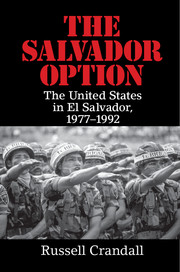Book contents
- Frontmatter
- Dedication
- Epigraph
- Contents
- List of Figures
- List of Organizations
- Acknowledgments
- 1 Introduction
- PART ONE EL SALVADOR IN THE COLD WAR
- PART TWO JIMMY CARTER
- 7 Revolution and Counterinsurgency in Guatemala
- 8 Mass Organizations
- 9 Carter Arrives
- 10 Carter and the Sandinista Revolution in Nicaragua, 1979
- 11 An October Coup
- 12 Carter Engages Salvador
- 13 Archbishop Romero
- 14 Land
- 15 The American Churchwomen
- 16 Arming the Rebels
- 17 Guerrilla Final Offensive, January 1981
- 18 Death Squads
- PART THREE RONALD REAGAN
- PART FOUR GEORGE H. W. BUSH
- PART FIVE POSTWAR
- Notes
- Bibliography
- Index
15 - The American Churchwomen
from PART TWO - JIMMY CARTER
Published online by Cambridge University Press: 05 June 2016
- Frontmatter
- Dedication
- Epigraph
- Contents
- List of Figures
- List of Organizations
- Acknowledgments
- 1 Introduction
- PART ONE EL SALVADOR IN THE COLD WAR
- PART TWO JIMMY CARTER
- 7 Revolution and Counterinsurgency in Guatemala
- 8 Mass Organizations
- 9 Carter Arrives
- 10 Carter and the Sandinista Revolution in Nicaragua, 1979
- 11 An October Coup
- 12 Carter Engages Salvador
- 13 Archbishop Romero
- 14 Land
- 15 The American Churchwomen
- 16 Arming the Rebels
- 17 Guerrilla Final Offensive, January 1981
- 18 Death Squads
- PART THREE RONALD REAGAN
- PART FOUR GEORGE H. W. BUSH
- PART FIVE POSTWAR
- Notes
- Bibliography
- Index
Summary
In this house are Communists. Everyone who enters here will die. Try it and see.
– A threatening letter received at a Catholic parish house, December 1980Those who work on the side of the poor suffer the same fate as the poor.
– Archbishop Óscar RomeroI hope you come to find that which gives life a deep meaning for you. Something worth living for, maybe even dying for.
– American Sister Ita Ford writing to her teenage niece“They Were Never Ours to Lose”
American nuns Ita Ford and Maura Clarke were members of the Maryknoll order, which specialized in international mission work. In 1980 they were working in the Salvadoran mountain town of Chalatenango assisting in a project for the resettlement of refugees fleeing the unfolding violence. Sister Dorothy Kazel, an Ursuline nun, and Jean Donovan, a lay volunteer, were conducting similar work for a parish in the coastal town of La Libertad.
Jean Donovan had previously worked at an accounting firm in Cleveland, Ohio, but in 1977 she quit her job and joined the Maryknoll Lay Mission, a Catholic order. Donovan was sent to El Salvador where she worked as an accountant. Not surprisingly, Donovan greatly admired Archbishop Romero and even worked with him. She regularly baked him chocolate chip cookies and dropped them off after Sunday mass. Although increasingly terrified as violence levels escalated in the late 1970s, Donovan continued her work: “Things are so much worse, it's unbelievable,” she reflected to a friend in May 1980. “People are being killed daily. We just found out that three people from our area had been taken, tortured, and hacked to death.” Not long after, two close friends were murdered immediately after walking her home. She considered returning to the United States. “I almost could,” she wrote, “except for the children, the poor, bruised victims of this insanity. Who would care for them? Whose heart could be so staunch as to favor the reasonable thing in a sea of their tears and loneliness? Not mine, dear friend, not mine.”
Dorothy Kazel and Maura Clarke also revealed their fears through their writing but, like Donavan, neither could bring themselves to leave El Salvador.
- Type
- Chapter
- Information
- The Salvador OptionThe United States in El Salvador, 1977–1992, pp. 160 - 166Publisher: Cambridge University PressPrint publication year: 2016



